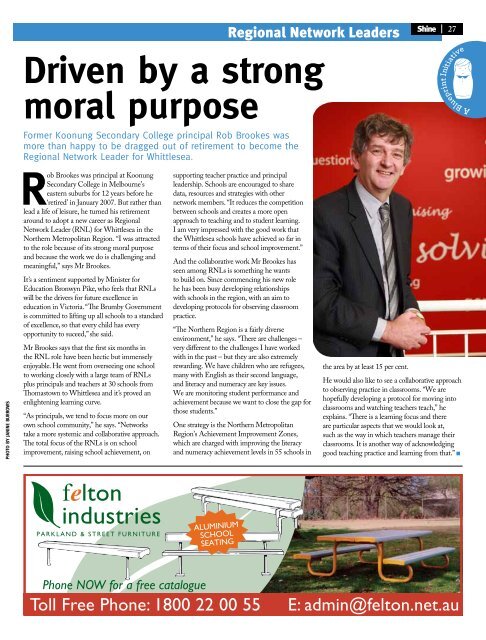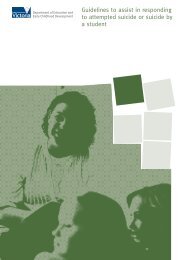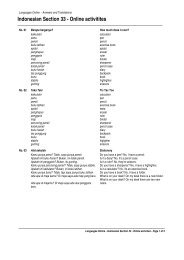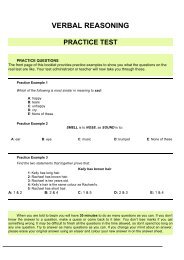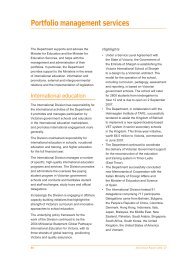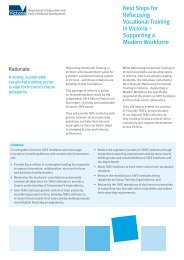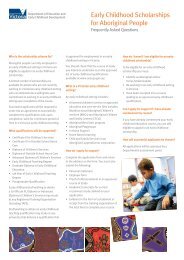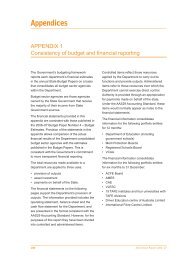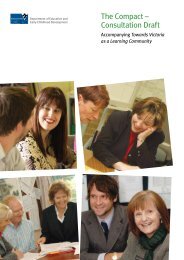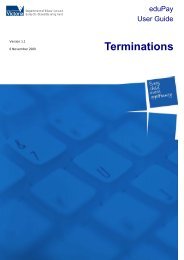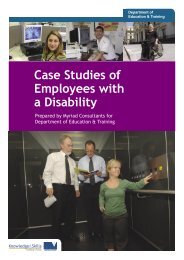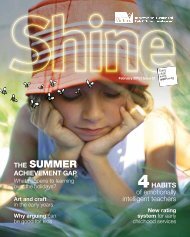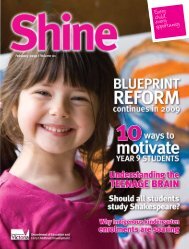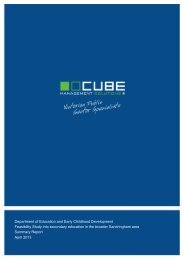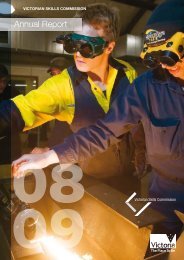Shine, March 2009, Vol. 02 - Department of Education and Early ...
Shine, March 2009, Vol. 02 - Department of Education and Early ...
Shine, March 2009, Vol. 02 - Department of Education and Early ...
You also want an ePaper? Increase the reach of your titles
YUMPU automatically turns print PDFs into web optimized ePapers that Google loves.
Regional Network Leaders<br />
<strong>Shine</strong> 27<br />
Driven by a strong<br />
moral purpose<br />
Former Koonung Secondary College principal Rob Brookes was<br />
more than happy to be dragged out <strong>of</strong> retirement to become the<br />
Regional Network Leader for Whittlesea.<br />
PHOTO BY JANINE BURROWS<br />
Rob Brookes was principal at Koonung<br />
Secondary College in Melbourne’s<br />
eastern suburbs for 12 years before he<br />
‘retired’ in January 2007. But rather than<br />
lead a life <strong>of</strong> leisure, he turned his retirement<br />
around to adopt a new career as Regional<br />
Network Leader (RNL) for Whittlesea in the<br />
Northern Metropolitan Region. “I was attracted<br />
to the role because <strong>of</strong> its strong moral purpose<br />
<strong>and</strong> because the work we do is challenging <strong>and</strong><br />
meaningful,” says Mr Brookes.<br />
It’s a sentiment supported by Minister for<br />
<strong>Education</strong> Bronwyn Pike, who feels that RNLs<br />
will be the drivers for future excellence in<br />
education in Victoria. “The Brumby Government<br />
is committed to lifting up all schools to a st<strong>and</strong>ard<br />
<strong>of</strong> excellence, so that every child has every<br />
opportunity to suceed,” she said.<br />
Mr Brookes says that the first six months in<br />
the RNL role have been hectic but immensely<br />
enjoyable. He went from overseeing one school<br />
to working closely with a large team <strong>of</strong> RNLs<br />
plus principals <strong>and</strong> teachers at 30 schools from<br />
Thomastown to Whittlesea <strong>and</strong> it’s proved an<br />
enlightening learning curve.<br />
“As principals, we tend to focus more on our<br />
own school community,” he says. “Networks<br />
take a more systemic <strong>and</strong> collaborative approach.<br />
The total focus <strong>of</strong> the RNLs is on school<br />
improvement, raising school achievement, on<br />
supporting teacher practice <strong>and</strong> principal<br />
leadership. Schools are encouraged to share<br />
data, resources <strong>and</strong> strategies with other<br />
network members. “It reduces the competition<br />
between schools <strong>and</strong> creates a more open<br />
approach to teaching <strong>and</strong> to student learning.<br />
I am very impressed with the good work that<br />
the Whittlesea schools have achieved so far in<br />
terms <strong>of</strong> their focus <strong>and</strong> school improvement.”<br />
And the collaborative work Mr Brookes has<br />
seen among RNLs is something he wants<br />
to build on. Since commencing his new role<br />
he has been busy developing relationships<br />
with schools in the region, with an aim to<br />
developing protocols for observing classroom<br />
practice.<br />
“The Northern Region is a fairly diverse<br />
environment,” he says. “There are challenges –<br />
very different to the challenges I have worked<br />
with in the past – but they are also extremely<br />
rewarding. We have children who are refugees,<br />
many with English as their second language,<br />
<strong>and</strong> literacy <strong>and</strong> numeracy are key issues.<br />
We are monitoring student performance <strong>and</strong><br />
achievement because we want to close the gap for<br />
those students.”<br />
One strategy is the Northern Metropolitan<br />
Region’s Achievement Improvement Zones,<br />
which are charged with improving the literacy<br />
<strong>and</strong> numeracy achievement levels in 55 schools in<br />
the area by at least 15 per cent.<br />
He would also like to see a collaborative approach<br />
to observing practice in classrooms. “We are<br />
hopefully developing a protocol for moving into<br />
classrooms <strong>and</strong> watching teachers teach,” he<br />
explains. “There is a learning focus <strong>and</strong> there<br />
are particular aspects that we would look at,<br />
such as the way in which teachers manage their<br />
classrooms. It is another way <strong>of</strong> acknowledging<br />
good teaching practice <strong>and</strong> learning from that.”<br />
ALUMINIUM<br />
SCHOOL<br />
SEATING


